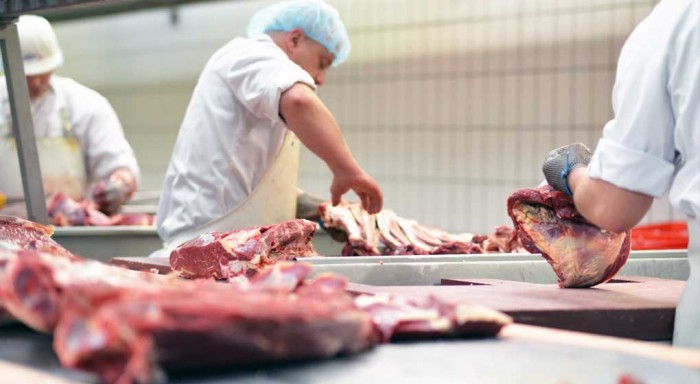The NPA has said it is ‘disgusted’ at revelations that thousands of tonnes of imported pork has been passed off as British by a manufacturer that is currently under investigation by the Food Standards Agency’s (FSA) National Food Crime Unit (NFCU)
Chief executive Lizzie Wilson urged the authorities to clamp down in the strongest possible terms on apparent illegal activity in the pork supply chain that she says undermines beleaguered UK producers who ‘go through hoops’ to deliver high quality British pork.
According to a ground-breaking investigation by Farmers Weekly, a food manufacturer has been passing up to tens of thousands of tonnes of imported pork per week as British. The investigation suggests this was happening ‘until at least the end of 2020’.
The medium-sized processor, which cannot be named for legal reasons, is understood, according to NPA, not be a primary processor with direct links to UK pork producers.
It has also been accused by former employees interviewed as part of the investigation of regularly ‘washing’ hams that are visibly off, or mixing rotting pork with fresh product for further processing.
Farmers Weekly reports that meat produced by the company ended up in products such as ready meals, quiches, sandwiches and other produce sold in Tesco, Asda, Co-op, Morrisons and Marks & Spencer. Other customers include food manufacturer and distributor Oscar Mayer, which supplies Sainsbury’s, Aldi, Ikea, Subway and airline food producer Dnata, and major brands Princes and BidFood.
Farmers Weekly reported that it has seen evidence showing Danish pork, which was only allowed to be sold on the mainland of China, was delivered to the factory. A former employee told the magazine that EU bacon medallions were being bought at £1/kg and sold on, as British, for about £12/kg.
The FSA and NFCU are reported to have been aware of the activities taking place at the processor since 2020.
Darren Davies, head of the NFCU confirmed that the agency is carrying out a criminal investigation into ‘how a supplier was allegedly providing products labelled as British when they were in fact sourced from elsewhere’.
“This is a complex and live investigation and we are looking into all new lines of enquiry with our partner organisations, including any potential food hygiene breaches at the premises. If any evidence of a food safety risk is found, then necessary action will be taken,” he said.
“The FSA advised retailers last year to check their cooked meat supply chain and to apply extra due diligence in their checks. We don’t give out these alerts without a reason.”
Reaction
NPA chief executive Lizzie Wilson said the revelations were shocking and called for the authorities to do everything in their powers to hold any business breaking the laws in this way to account.
“NPA is disgusted that such criminal behaviour still allegedly persists within the meat processing supply chain, despite it being previously brought to the attention of the competent authorities,” she said.
“This report suggests that this business has been able to profiteer from illegally labelled pork whilst British pig producers have been haemorrhaging money for over two years. We hope a full and thorough investigation is conducted to ensure such practice is identified and those responsible held to account.”
She pointed out that British pig farmers work very hard to meet high standards of welfare to produce high quality pork under Red Tractor, RSPCA Farm Assured and other assurance schemes.
“To see this wilfully undermined by manufacturers passing cheap imported pork off as British is a massive kick in the teeth for a sector that has been through so much in the past years. There will be some very angry pork producers out there.
“While the focus is currently on this one, unnamed company, people are naturally asking how widespread this sort of practice is. We will all need further reassurances that our supply chain is acting honourably and that the checks and systems in place in the UK are sufficient to detect fraud, particularly since our departure from the EU.
“In the meantime, we urge all consumers to seek out the Red Tractor and support our hard working British pig producers.”
The British Retail Consortium (BRC) said: “The role of the FSA [Food Standards Agency] is to work with retailers to prevent fraud. While we cannot comment on an ongoing investigation, retailers will support the FSA with its investigation into the individual supplier in question.”
Norman Bagley, the Association of Independent Meat Suppliers’ (AIMS) head of operations, said: “Reading the response from Darren Davies, head of the Food Standard Agency’s NFCU [National Food Crime Unit], we note that they alerted retailers, possibly via the secure Food Industry Intelligence Network [FIIN] members area in May 2022, some five months after first advising the FSA board about there being a live high-level food fraud investigation.
“The FIIN has, according to its website, just 58 members from a supply chain of thousands of food business operators.
“It is inexcusable that food manufacturers and food service businesses, some of whom supply some of society’s most vulnerable consumers, were not alerted at any time to date by the NFCU as to there either being a possibility of labelling fraud or of a risk to public health.”
Nick Allen, chief executive of the British Meat Processors Association, said: “The trouble with paper is evidence can be destroyed in a way it cannot with a digital trace.
“A lot of the smaller companies can’t afford to put that infrastructure in, but I think there comes a point where you just have to make people do it. If you want to supply the food chain, that’s probably what you’ve got to do.”




